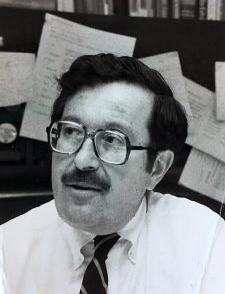NEWSLETTER
|
Richard Magat: “A Deeply Engaged Citizen of the Republic”
By Stanley N. Katz
HistPhil co-editor Stanley N. Katz remembers his friend, Richard Magat, the long-serving Ford Foundation communications director. HistPhil is a web publication on the history of the philanthropic and non-profit sector.
That would not have mattered to him, since he did not have a vain bone in his body. But in fact he was an important figure at the Ford Foundation for a quarter of a century, and he was one of the few foundation officials who were deeply and consistently supportive of the development of serious philanthropy scholarship. It is therefore important for HistPhil to remember Dick and to remind the field of his significance. And, to be clear, he was a particularly close friend of mine.
A few days ago I asked Susan Berresford, president of the Ford Foundation from 1996 to 2007, for a comment on Dick, and she responded that he “skillfully led Ford’s communications work and helped some of us then newcomers to the field understand the Foundation’s history. He had a devilish sense of humor that infused his philanthropic history lessons. I spoke with him just a few months ago when he called to check on some factoid from my early years at Ford. That sharp wit was still strong.” Susan has him just right, and he did retain his wit to the end.
Dick was a New Yorker to the core, growing up in the Bronx (where he lived for most of his life), attending DeWitt Clinton High School and New York University. He was a journalist at heart, but spent most of his professional career (25 years) as the Director of the Office of Reports at the Ford Foundation, now its Office of Communications. He, along with Frank Karel at Robert Wood Johnson (and Rockefeller), really created the modern position of communications and government relations for the large foundations.
It was their job to convey what the foundation was attempting to do both to the general public and to relevant government agencies. Dick carried out that function superbly well and was the unpretentious voice of the Ford Foundation for many years. The job required him to understand the full range of foundation programs, and to interpret them for the public and, again, for the government. He was later able to put his experience at Ford to work as the president of the Edward W. Hazen Foundation from 1983 to 1988.
I got to know Dick in the early 1980s when I was a member of the Research Committee of Independent Sector, since he was one of the few big foundation officials who took an affirmative interest in philanthropy research. In fact, Dick had the chops of a scholar, and I soon learned that he was an avid historian of the field in his own right.
He began his historical/analytical writing with a report called The Ford Foundation at Work, which was published in an effort to facilitate a transition in leadership at the Foundation. He later published his major work of scholarship, Unlikely Partners: Philanthropic Foundations and the Labor Movement (1998), which revealed his progressive politics. He also edited (1989) a volume entitled Philanthropic Giving: Studies in Varieties and Goals. Few philanthropic practitioners have had such a consistent scholarly engagement with the field, and Dick’s work was first-rate.
He continued his interest to the end, as indicated by a fine critical review in the Nonprofit and Voluntary Sector Quarterly (2009, pp.535-537) of two very different takes on the field, Mike Edwards (Just Another Emperor) and Bishop/Green, (Philanthrocapitalism). He dispassionately laid out both cases, and concluded that: “There is a danger of two parallel nonprofit worlds being created—one funded by the philanthrocapitalists that is much more business savvy and another that is the traditional sector relying on government and mass funding. I suspect that both sides have so much to offer each other they will increasingly find ways to make it work.”
He also produced original historical work late in life, especially his poignant account of the role of two DeWitt Clinton High School teachers in the famous Scopes trial on the teaching of evolution (“The Forgotten Roles of Two New York City Teachers in the Epic Scopes Trial,” Science & Society, v.70 n.4, Oct. 2006, 541-549).
Dick was, as befits a specialist in foundation government relations, very much concerned with and involved in public affairs. He was a member of a New York City commission that looked at the problem of the decentralization of schools, and wrote the final plan for the commission. He served on the Joint Committee on the Reappraisal of the Red Cross and edited the fine report produced by that body. He worked with the Joint Center for Political and Economic Studies to produce the first scholarly study of black philanthropy. And he was the vice-chair of the National Council on Crime and Delinquency, among many other such activities. He was a deeply engaged citizen of the republic, as well as a member in good standing of the republic of scholarship.
Dick was great fun to be with. He had a silly smile that lit up a room, and he was endlessly encouraging and supportive of younger people interested in philanthropy. He was very helpful to me in my attempts to understand the field. Dick Magat was an important and wonderful guy, and I miss him already.
|


